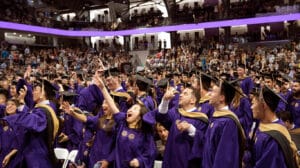McKinsey, BCG and Bain, collectively referred to as ‘MBB’, are widely recognized as the top management consultancy firms in the world. Each has well-established operations in several cities across the US.
This article will focus only on the San Francisco offices of McKinsey, BCG and Bain, and will answer some of the top-of-mind questions for potential candidates. Questions like:
- What kind of candidates are recruited by McKinsey, BCG and Bain’s San Francisco offices?
- Which undergraduate universities give you the highest chances of getting into the San Francisco offices of McKinsey, BCG or Bain?
- Is an MBA a good route to management consulting in San Francisco?
- Is there an entry path to the San Francisco offices of McKinsey, BCG or Bain from other industries?
The insights in this article come from a detailed analysis of over 300 individuals hired by McKinsey, BCG and Bain for client-facing consulting roles in their San Francisco offices from 2020 to mid-2022.
Key takeaways:
- 86% of hires into MBB firms in San Francisco come from only two channels: pre-experience students (45%) and MBAs (42%). Experienced professionals make up 9% of hires and advanced degree candidates make up 4%.
- Both McKinsey and Bain’s San Francisco offices hired over twice as many consultants as BCG between Q1 2020 and Q2 2022.
- McKinsey’s San Francisco office had clear gender parity in hiring, with female hires making up 51% of their hires. This is the only MBB firm in San Francisco that achieved gender parity.
- San Francisco’s tech industry has largely attracted local talent that would otherwise have gone into consulting. This means that MBB’s San Francisco offices fail to attract significant talent from Stanford – the top local university – in significant numbers. They do, however, recruit significantly from other nationally top-ranked universities and business schools, particularly those on the East Coast.
- Four universities supply close to half (48%) of pre-experience student hires into the San Francisco offices of McKinsey, BCG and Bain. These universities are UC Berkeley (25%), Stanford University (10%), the University of Pennsylvania (8%) and Georgetown University (5%)
- Three schools supply over half (51%) of MBA hires into the San Francisco offices of McKinsey, BCG and Bain. These are Haas School of Business (24%), Kellogg School of Management (14%) and the Wharton School (13%).
- If you did not study (at bachelor’s or master’s level) at a target US undergraduate or master’s program, an MBA at a top US program is your best route to breaking into MBB’s San Francisco offices.
- San Francisco’s experienced hire share of 9% of the total is small compared to that of the US as a whole (16%) and other top locations like New York (19%) and Chicago (16%). This reaffirms the tough value proposition of consulting for prospective employees in San Francisco, given the alternative options in the tech industry.
The main sources of candidates for top consulting firms’ San Francisco offices
MBB’s San Francisco offices primarily hire pre-experience students and MBAs
86% of hires into MBB firms in San Francisco come from only two channels: pre-experience students (45%) and MBAs (42%). Experienced professionals make up 9% of hires and advanced degree candidates make up 4%.
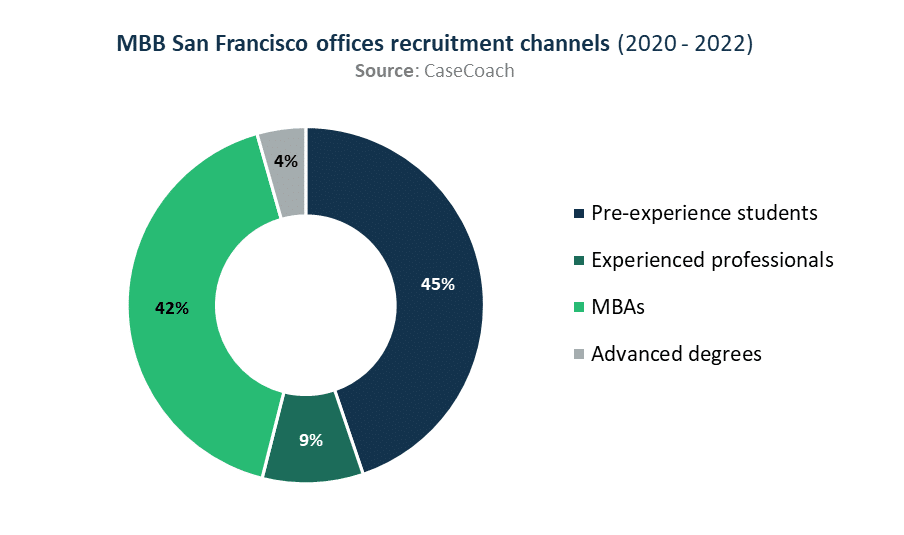
To understand these categories better, here are quick definitions:
- Pre-experience students (bachelor’s degree or a non-MBA master’s degree) are hired out of university or shortly after. They typically have no more than two years of experience and are hired into entry-level roles (i.e. Business Analysts at McKinsey, Associates at BCG and Associate Consultants at Bain).
- MBA hires are graduates of a one or two-year MBA program. They typically have work experience gained before their MBAs and are hired into post-MBA roles (i.e. Associates at McKinsey and Consultants at BCG and Bain).
- Experienced hires are from other employers and typically have two to eight years of experience. Those with less are hired into pre-MBA roles (i.e. Senior Business Analysts at McKinsey, 2nd year Associate Consultants at Bain and Senior Associates at BCG). Those with significant experience are hired into post-MBA roles (i.e. Associates at McKinsey and Consultants at BCG and Bain).
- Advanced degree hires are hired during or soon (not more than two years) after their Ph.D. or medical school programs. They’re typically hired into post-MBA roles in the US (i.e. Associates at McKinsey and Consultants at BCG and Bain).
McKinsey and Bain both hired more candidates than BCG
Both McKinsey and Bain’s San Francisco offices hired over twice as many consultants as BCG between Q1 2020 and Q2 2022.
There were some disparities in the hiring mix per firm. MBAs made up the majority of McKinsey’s (47%) and BCG’s (42%) hires, while pre-experience students contributed the majority for Bain (52%). Experienced hires contributed 16% of BCG’s hires, unlike McKinsey and Bain (8% and 7% respectively).
McKinsey’s San Francisco office hired more women than men
McKinsey’s San Francisco office had clear gender parity in hiring, with female hires making up 51% of its hires. This was not the case at BCG and Bain, where female hires made up 38% and 34% of candidates respectively.
Pre-experience student hiring in McKinsey, BCG and Bain’s San Francisco offices
Pre-experience students made up 45% of total hires by MBB’s San Francisco offices from Q1 2020 to Q2 2022. This means that hires from a bachelor’s degree or a master’s degree program (excluding MBAs) made up the largest recruitment channel for entry-level roles.
The next section will look closely at which universities the pre-experience student hires of MBB’s San Francisco offices attended.
Where did San Francisco MBB’s pre-experience student hires go to university?
The top two universities that supplied pre-experience student hires into MBB’s San Francisco offices are UC Berkeley (25%) and Stanford (10%).
This means that 65% of MBB’s pre-experienced student hires in San Francisco relocated from other areas, primarily the East Coast. Almost none of these hires graduated from an international university.
This, and the low contribution of Stanford University compared to Berkeley, demonstrates the challenge posed by tech firms in the competition for top talent in San Francisco. It is clear that many Stanford graduates, and more broadly, many graduates from Bay Area universities, chose to work in tech at the expense of top consulting firms.
The chart below lists the 13 universities that contribute more than 1% of hires to the total. Together, they account for 75% of pre-experience student hires.
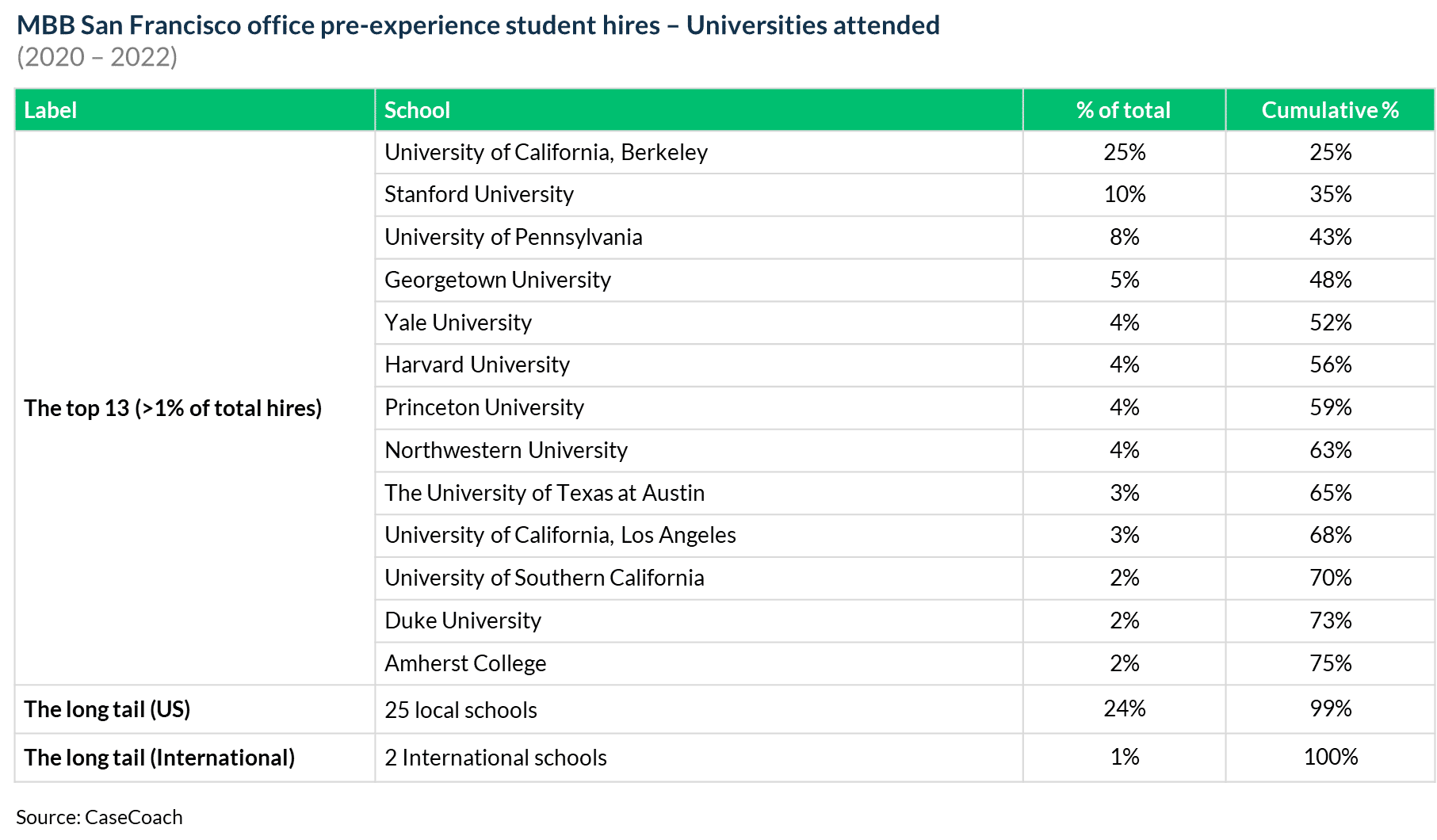
It is worth noting that MBB firms in San Francisco are able to attract talent from many nationally top-ranked universities (e.g. Yale, Harvard, Princeton). This suggests that the location is attractive despite the local competition from tech employers.
Of the top three firms, BCG appears to be the most open to various universities. Thirty percent of their pre-experience student hires originated from the long tail of universities, compared to 28% for McKinsey and 22% for Bain.
What did they study?
Sixty-four percent of pre-experience student hires into MBB’s San Francisco offices graduated with a degree in either economics (28% of the total), business administration (23%) or engineering degree (13%). The remaining studied a variety of other disciplines.
Unlike in European offices (e.g. France and Germany), a master’s degree doesn’t seem to give candidates a distinct edge. Pre-experience students with a master’s degree made up only 11% of pre-experience students, compared with 89% without. This is similar to the US total and Canada.
MBA hiring in McKinsey, BCG and Bain’s San Francisco offices
Forty-two percent of all hires into the San Francisco offices of McKinsey, BCG and Bain came from an MBA program. MBAs made up 47% of hires at McKinsey, 42% at BCG and 36% at Bain.
As a reminder, MBA hires are graduates of a on or two-year MBA program, usually at a US business school. They typically have some work experience, gained before their MBAs, and are hired into post-MBA roles (i.e. Associates at McKinsey and Consultants at BCG and Bain).
For MBA hires, we will explore two questions:
- Which business schools did they attend?
- Which undergraduate universities did they attend?
Which business schools did San Francisco MBB’s MBA hires attend?
Three schools supplied around half (51%) of MBA hires into the San Francisco offices of McKinsey, BCG and Bain. They are:
- Haas School of Business (24%)
- Kellogg School of Management (14%)
- The Wharton School (13%)
Similar to the pre-experience student channel, most of the MBA hires into MBB’s San Francisco offices relocated from other areas, primarily the East Coast.
The high contribution of Berkeley is impressive, given that it typically sits outside the top seven US MBAs. By contrast, Stanford, which is typically ranked among the top three US MBAs, only contributed 5% of MBA hires to MBB firms in San Francisco.
This confirms the challenge posed by the tech industry in the competition for top talent. Only 15% of Stanford GSB’s last-class graduates who were not sponsored by their employers chose a management consulting role. By comparison, 65% chose to either work in tech, start their own business or join an investment firm.
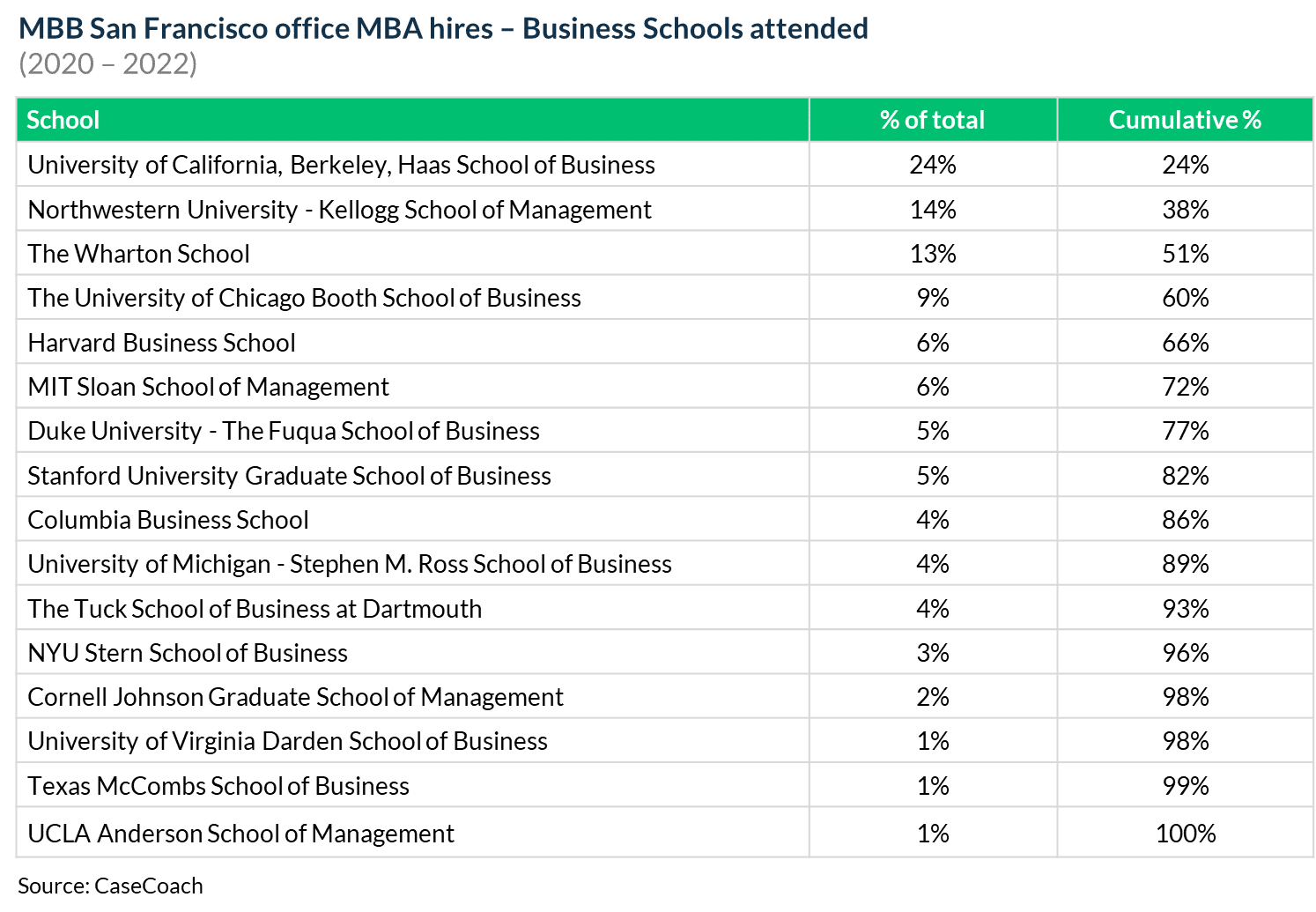
As with pre-experience students, it’s worth noting that MBB firms in San Francisco are able to attract talent from many nationally top-ranked business schools (e.g. Harvard, Wharton), suggesting that the location remains attractive despite the competition from tech employers.
The remaining 49% of hires were supplied by 13 US business schools. MBB’s San Francisco offices did not hire any candidate with an international MBA degree.
Which undergraduate universities did San Francisco MBB’s MBA hires attend?
MBA hires into MBB’s San Francisco offices came from over 90 undergraduate programs. This is a broader range of universities (over 2x) than was considered in pre-experience student hiring, where 40 universities were represented. This indicates more educational background openness for the MBA hiring channel.
Thirty-eight percent of MBA hires into MBB’s San Francisco offices came from an international undergraduate program, making it the largest channel of entry for international candidates. Thus, if you did not study (at bachelor’s or master’s level) at a target US undergraduate or master’s program, an MBA at a top US program is your best route to breaking into MBB’s San Francisco offices.
Experienced professional hiring in McKinsey, BCG and Bain’s San Francisco offices
The ‘experienced hires’ channel, in which candidates typically have two to eight years of professional experience, was the third-largest recruitment channel for MBB’s San Francisco offices from Q1 2020 to Q2 2022. It made up ~9% of all hires by these three firms. Experienced hires made up 16% of BCG’s total and 7-8% of the total for both McKinsey and Bain.
San Francisco’s experienced hire share of 9% of the total is small compared to that of the US as a whole (16%) and other top locations like New York (19%) and Chicago (16%). This reaffirms the tough value proposition of consulting for prospective employees in San Francisco, given the alternative options in the tech industry.
Experienced hires joined MBB’s San Francisco offices at different levels:
- 17% of experienced hires were recruited into pre-MBA roles (i.e. Business Analysts at McKinsey, Associate, Senior Associate Consultants at Bain and Senior Associates at BCG).
- 83% of experienced hires were recruited into post-MBA roles (i.e. Associates at McKinsey and Consultants at BCG and Bain). Candidates with team leadership experience at other consulting firms sometimes join at a more senior level but will typically experience a small step back in seniority compared to their previous firm.
Which industries did San Francisco MBB’s experienced hires come from?
Thirty-eight percent of MBB’s experienced hires to their San Francisco offices came from other consulting firms. These include other strategy consulting firms (e.g. L.E.K) and the strategy teams of Big-4 accounting firms (e.g. Strategy& at PwC, EY-Parthenon).
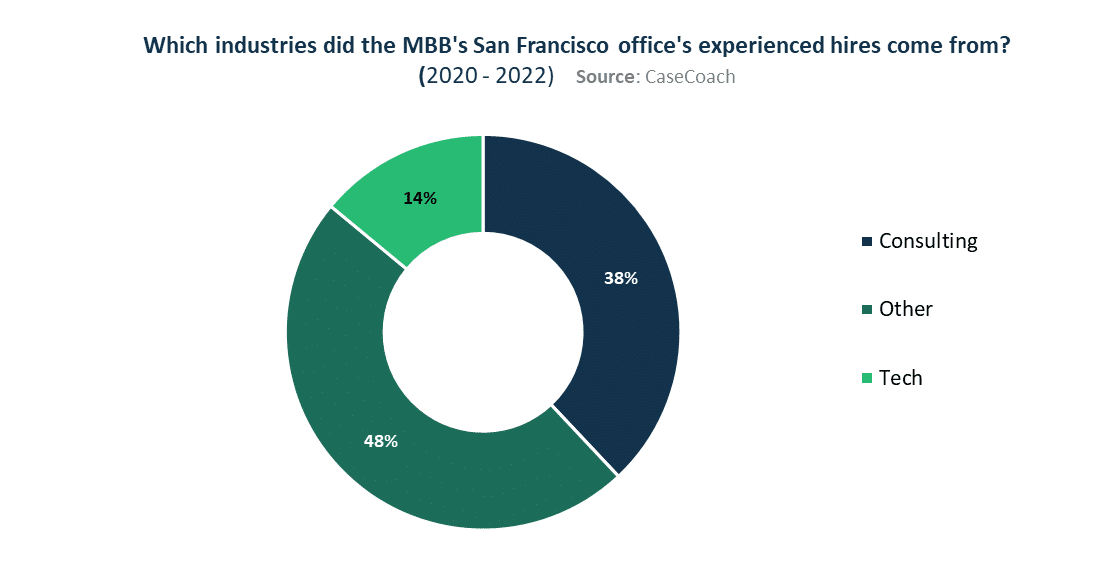
The tech industry contributed about 14% of experienced hires, while the remaining 48% came from a wide range of unrelated industries.
Where did MBB’s experienced hires go to school?
The largest four undergraduate contributors for the pre-experience student channel – UC Berkeley, Stanford University, University of Pennsylvania and Georgetown University – contributed only 10% of experienced professionals. This signals that, like the MBA hire channel, experienced professionals from a wider range of undergraduate programs are considered.
MBB firms in San Francisco collectively have one of the highest proportions (31%) of experienced hires who hold international undergraduate degrees. This is likely due to the prevalence of foreign talent in the tech industry.
Advanced degree hiring in McKinsey, BCG and Bain’s San Francisco offices
Advanced degrees were the smallest proportion of hires for McKinsey, BCG and Bain’s San Francisco offices, making up just 4% of total hiring. Over a third (36%) of advanced degree hires came from Stanford (17%), with the rest spread across nine other US universities.
What’s next if you’d like to get into McKinsey, BCG, and Bain’s San Francisco Offices
Looking to join McKinsey, BCG, or Bain’s San Francisco offices? CaseCoach has resources to guide you all the way from your resume crafting stage to your final interviews.
Our Free Resume Course provides resume and cover letter templates and specialized advice for students, MBAs, and experienced professionals.
The Consulting Interview Prep Toolkit contains all the material you need to ace your case and fit interview, including online courses, sample interviews, case material and practice tools.
CaseCoach’s team of coaches includes former consultants and interviewers with McKinsey, BCG, and Bain. They are available to deliver case and fit interview coaching and mock interviews in a realistic setting to put your preparation to the test, providing personal feedback and practical advice to help you ace your interviews.

